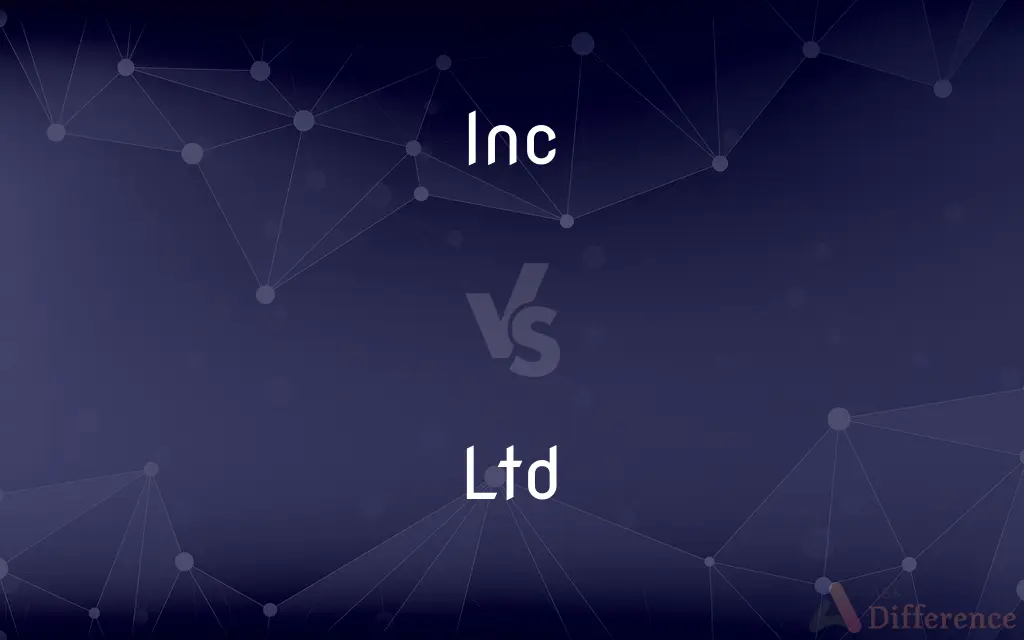Inc vs. Ltd — What's the Difference?
Edited by Tayyaba Rehman — By Fiza Rafique — Published on November 5, 2023
"Inc." stands for "Incorporated," used in the U.S. to denote a corporation, while "Ltd." means "Limited," commonly used in the UK to indicate a private limited company.

Difference Between Inc and Ltd
Table of Contents
ADVERTISEMENT
Key Differences
"Inc." is an abbreviation for "Incorporated," often used in the names of corporations in the U.S. "Ltd.", short for "Limited," is a term used primarily in the UK and other Commonwealth nations to denote a private limited company.
When a company uses "Inc." in its name, it signifies that it's a legally distinct entity, and its shareholders have limited liability. Similarly, "Ltd." designates that the company is separate from its owners, and they are only liable up to the amount they've invested.
Both "Inc." and "Ltd." entities have specific regulatory and tax obligations they must fulfill. While "Inc." corporations may be subject to certain U.S. federal regulations, "Ltd." companies adhere to the Companies Act in the UK.
In terms of perception, "Inc." businesses are often seen as established and large-scale corporations in the U.S., while "Ltd." companies in the UK may range from small enterprises to larger entities.
It's essential to understand the distinction between "Inc." and "Ltd." as they are indicative of a company's legal structure, liabilities, and obligations in their respective regions.
ADVERTISEMENT
Comparison Chart
Meaning
Abbreviation for "Incorporated"
Abbreviation for "Limited"
Common Usage
Predominantly in the U.S.
Primarily in the UK and Commonwealth nations
Liability
Shareholders have limited liability
Owners have liability up to their investment
Typical Perception
Seen as established, large-scale corporations
Can range from small enterprises to larger entities
Regulatory Reference
Subject to U.S. federal regulations
Governed by the UK's Companies Act
Compare with Definitions
Inc
Subject to specific federal regulations in the U.S.
As an Inc., the organization must comply with certain federal rules and regulations.
Ltd
Denotes a private limited company where owners' liabilities are restricted.
As an Ltd., the owners are only liable up to their invested amounts.
Inc
Often used in the names of larger, established companies.
Microsoft Inc. is a global leader in software development.
Ltd
Governed by the Companies Act in the UK.
Any Ltd. in the UK must adhere to the stipulations set by the Companies Act.
Inc
An abbreviation for "Incorporated" in the U.S.
Apple Inc. is a multinational technology company.
Ltd
Commonly used in company names across Commonwealth nations.
Many businesses in Australia and Canada also use Ltd. in their names.
Inc
Indicates a corporation with limited liability for its shareholders.
By becoming Inc., the company ensured that its shareholders would not be personally liable for the firm's debts.
Ltd
Represents a distinct legal entity separate from its proprietors.
When the firm became an Ltd., it gained its legal identity.
Inc
Denotes a legally distinct entity from its owners.
Once the business transitioned to an Inc., it became a separate legal entity.
Ltd
Short for "Limited" primarily used in the UK.
Smith Industries Ltd. expanded its operations this year.
Inc
Alternative spelling of Inc
Inc
Abbr of incoming
Inc
(programming) increment
Inc
(knitting) increase
Inc
A Japanese measure of length equal to about two and one twelfth yards.
Inc
A heterogeneous collection of groups united in their opposition to Saddam Hussein's government of Iraq; formed in 1992 it is comprised of Sunni and Shiite Arabs and Kurds who hope to build a new government
Common Curiosities
In which countries is "Ltd." a common designation?
"Ltd." is primarily used in the UK and other Commonwealth nations.
Where is "Inc." commonly used?
"Inc." is predominantly used in the U.S.
What's the meaning of "Ltd."?
"Ltd." is short for "Limited."
What regulations do "Inc." corporations follow?
"Inc." corporations are subject to specific U.S. federal regulations.
Can both "Inc." and "Ltd." be used interchangeably?
No, they are region-specific and denote different types of corporate structures.
Can an "Ltd." be a small business?
Yes, "Ltd." companies can range from small enterprises to larger entities.
What does "Inc." stand for?
"Inc." stands for "Incorporated."
Does "Inc." offer liability protection to its shareholders?
Yes, shareholders of an "Inc." have limited liability.
Are "Inc." entities always large corporations?
Not necessarily, but "Inc." is often associated with larger, established corporations.
Which act governs "Ltd." companies in the UK?
"Ltd." companies in the UK are governed by the Companies Act.
How does a business decide between "Inc." and "Ltd."?
The decision is often based on the business's location, size, and specific legal and financial goals.
How is the liability determined in an "Ltd." company?
In an "Ltd." company, owners have liability limited to their investment.
Which offers more liability protection: "Inc." or "Ltd."?
Both offer limited liability protection, but the specifics vary based on local laws and regulations.
Is "Ltd." used outside of the UK?
Yes, "Ltd." is also used in many Commonwealth nations, including Canada and Australia.
Are there tax implications associated with "Inc." and "Ltd." designations?
Yes, each designation has specific tax implications based on the country's tax code.
Share Your Discovery

Previous Comparison
Calcium vs. Calcium Carbonate
Next Comparison
Nuclear Fission vs. Nuclear FusionAuthor Spotlight
Written by
Fiza RafiqueFiza Rafique is a skilled content writer at AskDifference.com, where she meticulously refines and enhances written pieces. Drawing from her vast editorial expertise, Fiza ensures clarity, accuracy, and precision in every article. Passionate about language, she continually seeks to elevate the quality of content for readers worldwide.
Edited by
Tayyaba RehmanTayyaba Rehman is a distinguished writer, currently serving as a primary contributor to askdifference.com. As a researcher in semantics and etymology, Tayyaba's passion for the complexity of languages and their distinctions has found a perfect home on the platform. Tayyaba delves into the intricacies of language, distinguishing between commonly confused words and phrases, thereby providing clarity for readers worldwide.













































